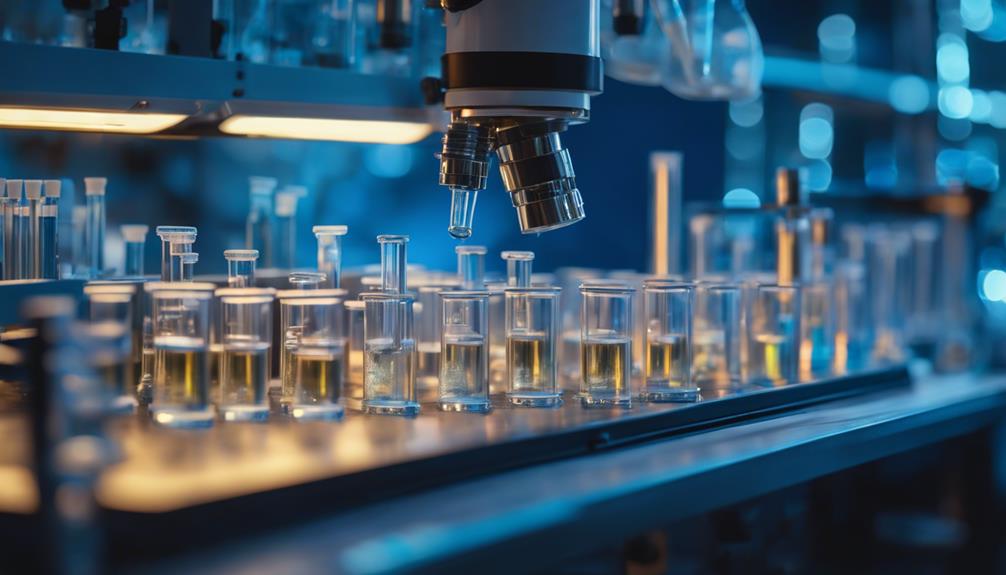Polymerase Chain Reaction (PCR) is an essential tool in molecular biology, offering several advantages and some limitations. Its exceptional sensitivity allows for the amplification of minor DNA quantities, making it versatile for applications like cloning, pathogen detection, and forensic analysis. The rapid turnaround time and minimal equipment requirements improve its accessibility across labs. Nevertheless, PCR is susceptible to contamination, which can lead to false positives. Additionally, it requires precise temperature control and prior knowledge of target sequences for effective primer design. Understanding these pros and cons can provide deeper understanding into its transformative impact on scientific research.
Main Points
- PCR offers exceptional sensitivity, allowing for the amplification of minute DNA quantities to detectable levels.
- It has versatile applications, including cloning, sequencing, and pathogen detection in various fields.
- Rapid turnaround time typically completes PCR reactions within a few hours, enhancing efficiency.
- However, PCR is sensitive to contamination, which can lead to false-positive results if not managed properly.
Advantages of PCR
One remarkable advantage of polymerase chain reaction (PCR) is its exceptional sensitivity, allowing for the amplification of minute quantities of DNA to detectable levels within a relatively short time frame. This feature makes PCR an essential tool in various fields, including molecular biology, forensic science, and medical diagnostics. The technique can detect DNA from a single cell, which is particularly beneficial in early disease diagnosis and genetic research.
Additionally, PCR is remarkably versatile and can be modified for numerous applications, such as cloning DNA, sequencing, and detecting pathogens. This flexibility enables researchers to tailor the protocol to meet specific experimental requirements, enhancing its utility across diverse scientific disciplines.
The rapid turnaround time of PCR, often completed within a few hours, promotes timely decision-making in clinical settings, such as identifying infectious agents. Moreover, the reaction can be performed with minimal equipment, making it accessible to laboratories of varying capacities.
Ultimately, the combination of sensitivity, versatility, and speed positions PCR as a cornerstone technology in genetic analysis, leading to advancements in research, healthcare, and biotechnology. Its broad applicability continues to drive innovations in DNA analysis and diagnostics.
Disadvantages of PCR
Despite its numerous advantages, PCR is not without considerable disadvantages that can impact its reliability and effectiveness in various applications.
One notable limitation is the potential for contamination, which can lead to false-positive results. Contaminants, such as trace amounts of DNA from previous experiments, may enhance during the PCR process, resulting in misleading data.
Another drawback is the requirement for precise temperature control and cycling conditions. Variability in these factors can affect the efficiency of enhancement and the specificity of the reaction, leading to inconsistent results.
Additionally, PCR is sensitive to the quality and quantity of starting material; degraded or low-concentration samples may yield suboptimal or no results.
Moreover, PCR typically requires prior knowledge of the target sequence to design specific primers, which limits its applicability to known sequences. This specificity can also result in the failure to enhance closely related sequences, which may be essential in certain analyses.
Applications of PCR
PCR, or Polymerase Chain Reaction, serves as a fundamental tool in various fields, including molecular biology, medical diagnostics, and forensic science, enabling the enhancement of specific DNA sequences for analysis. This technique has revolutionized genetic research and has numerous practical applications that improve our understanding and capabilities in these areas.
| Field | Application | Description |
|---|---|---|
| Molecular Biology | Gene Cloning | Increasing genes for insertion into vectors. |
| Medical Diagnostics | Disease Detection | Identifying pathogens in infectious diseases. |
| Forensic Science | DNA Profiling | Analyzing genetic material from crime scenes. |
| Environmental Science | Biodiversity Studies | Monitoring genetic diversity in species. |
Through these applications, PCR not only aids in research but also advances public health and safety. Its role in rapid diagnostics, especially during outbreaks, has proven crucial. As technology advances, the potential applications of PCR continue to expand, solidifying its position as a cornerstone of modern scientific and medical practices.
Common Questions
How Does PCR Compare to Other DNA Amplification Methods?
PCR, or Polymerase Chain Reaction, is a highly efficient DNA amplification method, known for its specificity and rapid amplification capabilities. Compared to other techniques, it offers greater sensitivity and versatility, making it a preferred choice in various applications.
What Are the Limitations of PCR in Forensic Science?
PCR's limitations in forensic science include susceptibility to contamination, requirement for precise temperature control, potential for false positives, and challenges in enhancing degraded DNA samples, which can hinder accurate analysis and interpretation of forensic evidence.
Can PCR Be Used for RNA Amplification?
Yes, PCR can be utilized for RNA enhancement through a modified technique known as reverse transcription PCR (RT-PCR), which first converts RNA into analogous DNA (cDNA) before amplifying the cDNA using standard PCR methods.
How Does Contamination Affect PCR Results?
Contamination considerably impacts PCR results by introducing extraneous DNA or RNA, leading to false positives or erroneous quantification. Strict laboratory practices and control measures are essential to minimize contamination and guarantee reliable, accurate amplification outcomes.
What Are the Costs Associated With PCR Testing?
The costs associated with PCR testing include various factors, including reagent expenses, equipment maintenance, labor, and overhead. These expenses can vary greatly based on testing volume, laboratory infrastructure, and specific testing protocols employed.
Conclusion
Polymerase Chain Reaction (PCR) presents numerous advantages, including its sensitivity, specificity, and ability to enhance minute amounts of DNA.
Nevertheless, it also has notable disadvantages, such as the risk of contamination and the requirement for precise temperature control.
The applications of PCR span various fields, including medical diagnostics, forensic science, and genetic research.
In the end, the benefits and limitations of PCR must be carefully considered to optimize its use in both research and clinical settings.
